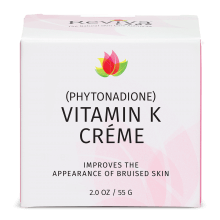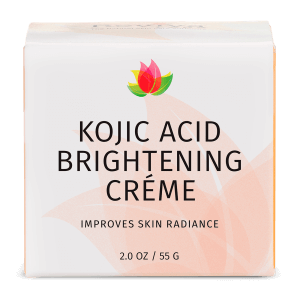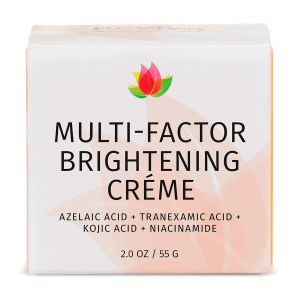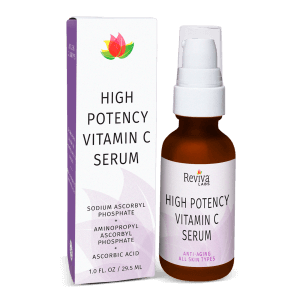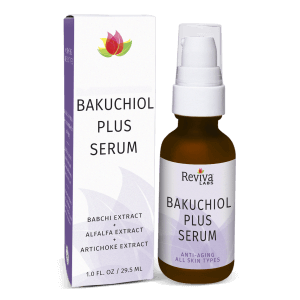Ingredients, Reviva Labs, Skin Care
Does Vitamin K Brighten Skin?
Vitamin K, often associated with blood clotting and bone health, has recently been making waves in the skincare industry. This vitamin, particularly in its form K1 (phylloquinone) and K2 (menaquinone), is now being touted as a potential game-changer for achieving a brighter, more even skin tone. But can Vitamin K truly deliver on these promises? This article explores the science behind Vitamin K and its potential benefits for the skin.
Understanding Vitamin K
Vitamin K is a fat-soluble vitamin essential for various bodily functions. Its primary role is to help in blood coagulation, which prevents excessive bleeding when injuries occur. Beyond its well-known function in the bloodstream, Vitamin K also plays a role in bone metabolism and regulating calcium levels in the blood. The vitamin exists in two main forms: K1, found in leafy green vegetables, and K2, found in fermented foods and animal products.
In the context of skincare, Vitamin K has garnered attention for its purported benefits in reducing dark circles, bruising, and spider veins. Some skincare enthusiasts and professionals claim that it can also enhance skin brightness and even out skin tone. But what does the science say about these claims?
Vitamin K and Skin Brightness
The concept of skin brightness generally refers to the skin’s overall clarity, tone, and radiance. Factors such as hyperpigmentation, dark spots, and uneven skin tone can affect the skin’s appearance, making it look dull and tired. Vitamin K is believed to help with these issues due to its role in blood clotting and its potential anti-inflammatory properties.
One of the key ways Vitamin K might improve skin brightness is through its impact on bruising and dark circles. Dark circles under the eyes can be caused by several factors, including genetics, age, and lifestyle. However, blood pooling under the thin skin of the eye area is a significant contributor. Vitamin K, by aiding in blood clotting and potentially improving blood circulation, may help reduce the appearance of these dark circles.
Scientific Evidence
While the theoretical benefits of Vitamin K are intriguing, scientific studies specifically focused on its effects on skin brightness are limited. A few studies have shown promising results. For instance, a study published in the Journal of Cosmetic Dermatology examined the effects of a cream containing Vitamin K and other ingredients on dark circles and found a noticeable improvement in the appearance of under-eye circles after regular application. However, it is crucial to note that these creams often contain a blend of ingredients, making it difficult to attribute the results solely to Vitamin K.
Another study highlighted that Vitamin K might help with post-procedural bruising and redness. This study observed that patients who applied a topical Vitamin K cream after undergoing laser treatments experienced reduced bruising and quicker healing times compared to those who did not use the cream. These findings suggest that Vitamin K may have a positive effect on skin appearance following trauma or cosmetic procedures.
Mechanisms of Action
The potential benefits of Vitamin K for the skin may be attributed to several mechanisms. Firstly, its role in blood clotting can help minimize the appearance of bruises and dark circles, as previously mentioned. Secondly, Vitamin K’s anti-inflammatory properties can help soothe irritated skin and reduce redness, contributing to a more even skin tone.
Vitamin K also interacts with other vitamins and compounds within the skin. For example, Vitamin K is known to work synergistically with Vitamin A, which is renowned for its anti-aging and skin-brightening effects. This interaction may enhance the overall efficacy of skincare products containing both vitamins, offering a more comprehensive approach to achieving brighter skin.
Practical Application
For those considering incorporating Vitamin K into their skincare routine, there are a few practical points to keep in mind. Topical creams, such as Reviva Labs’ Vitamin K Creme, and serums containing Vitamin K are widely available and can be easily integrated into existing skincare regimens. These products are often formulated with other beneficial ingredients, such as hyaluronic acid, Vitamin C, and peptides, to maximize their effects.
When selecting a Vitamin K product, it is important to look for reputable brands and formulations that have been dermatologically tested. Additionally, consistency is key; regular application, as directed, is necessary to see potential benefits over time. Users should also be patient, as changes in skin appearance can take several weeks to become noticeable.
Vitamin K in Diet and Lifestyle
While topical application of Vitamin K can offer targeted benefits, maintaining a healthy diet rich in this vitamin is also beneficial for overall skin health. Leafy green vegetables like kale, spinach, and broccoli are excellent sources of Vitamin K1. Fermented foods like natto and certain cheeses provide Vitamin K2. Ensuring an adequate intake of these foods can support skin health from the inside out.
Moreover, a balanced diet, hydration, and a healthy lifestyle, including regular exercise and adequate sleep, are fundamental to maintaining bright, healthy skin. Vitamin K should be seen as a complementary part of a holistic approach to skincare rather than a standalone solution.
Conclusion
The potential of Vitamin K to brighten skin is a topic of growing interest. While there is some evidence to suggest that it can help reduce dark circles, bruising, and improve overall skin tone, more research is needed to fully understand its effects and mechanisms.
For those looking to enhance their skincare routine, incorporating Vitamin K products may offer additional benefits, particularly when combined with a healthy lifestyle and diet. As always, it is recommended to consult with a dermatologist or skincare professional to determine the best approach for individual skin concerns and needs.







